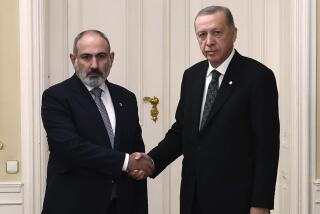Baker Urges Peace in Disputed Enclave : Armenia: The secretary refuses to take sides in the bloody battle with Azerbaijan over Nagorno-Karabakh. He will visit the Azerbaijani capital today.
- Share via
YEREVAN, Armenia — Secretary of State James A. Baker III, trying to walk a diplomatic tightrope over the most bitter ethnic conflict raging in the ruins of the Soviet Union, called Tuesday for a peaceful settlement of the fighting in Nagorno-Karabakh. But he carefully avoided placing blame.
“Our message is for peaceful resolution of disputes,” Baker said as he met Armenian President Levon Ter-Petrosyan at the president’s modest two-story residence in this capital city.
It was the first visit by Baker to Armenia, coming less than two weeks after the United States established an embryonic embassy on the eighth floor of Yerevan’s best hotel.
Nagorno-Karabakh, a predominantly Christian, Armenian enclave surrounded by Muslim Azerbaijan, has declared its independence from Azerbaijan. In response, Azerbaijan clamped a military blockade on Nagorno-Karabakh and cut off trade and energy supplies to Armenia.
Although Americans of Armenian descent and their supporters in Congress have demanded that the United States have no relations with Azerbaijan until the dispute is settled, Baker refuses to do that. He visits Azerbaijan’s capital today as the third stop on a tour of seven republics of the former Soviet Union.
A senior State Department official hinted that Washington will soon establish diplomatic relations with Azerbaijan, despite concerns about the Baku government’s crackdown on the independence-minded enclave. The United States established diplomatic ties with Armenia last month.
In a joint news conference with Ter-Petrosyan, Baker said the United States cannot take sides in the dispute, and he made it clear that he believes all parties bear at least some responsibility for causing the conflict and that all must make compromises to settle it.
Nevertheless, Ter-Petrosyan and his Los Angeles-born foreign minister, Raffi Hovanissian, said they are satisfied with American policy.
“The United States has played a productive role to the extent it has asked Azerbaijan to stand back from its attempt to impose a military solution on a political problem,” Hovanissian said.
The foreign minister, who gave up a Los Angeles law practice to follow what he called “the American dream” of returning to a leadership role in the land of his ancestors, said he suggested that Baker should visit the disputed enclave to get a better feel for the situation.
But Baker made it clear that he has no intention of going there.
Hovanissian said Armenia did not specifically ask the United States to recognize the independence of Nagorno-Karabakh, “although we believe that is the proper result.”
The Nagorno-Karabakh dispute dominated Baker’s 14-hour overnight visit to Armenia. Although the government guest house where he stayed--and the hotel where his staff and the reporters that follow him were housed--enjoy adequate heat and electricity, Yerevan is a mostly cold, dark city. With a gas pipeline through Azerbaijan shut down, the new nation has little fuel to heat its homes and generate electricity. Most of the country is subject to rolling blackouts. Armenia is now planning to reopen a nuclear power plant that was closed two years ago for environmental and safety reasons.
Earlier in the day, Baker conferred in Kishinev with President Mircea Snegur of Moldova, a tiny republic on the border of Romania.
In a joint news conference, Snegur, a former Communist Party bureaucrat, said his government is prepared to abide by all American terms for diplomatic recognition--democratic politics, free-market economics, adherence to treaties signed by the former Soviet Union and respect for human rights and the rights of minorities.
Snegur said his government is determined to respect the rights of the Gagauz, a Turkish Christian community, and of the Russian and Ukrainian minority living near the Dniester River.
“We do not see (the Gagauz situation) as a bar to diplomatic relations, in that we have received very specific assurances that the rights of minorities will be respected,” Baker said.
A senior State Department official predicted that the United States will extend diplomatic recognition to Moldova next week after Snegur calls on Bush in the White House.
The Moldovan president, who quit the Communist Party’s Central Committee after becoming chairman of the Moldovan Supreme Soviet in 1989, will be in the United States to celebrate Moldovan membership in the United Nations.
More to Read
Sign up for Essential California
The most important California stories and recommendations in your inbox every morning.
You may occasionally receive promotional content from the Los Angeles Times.













